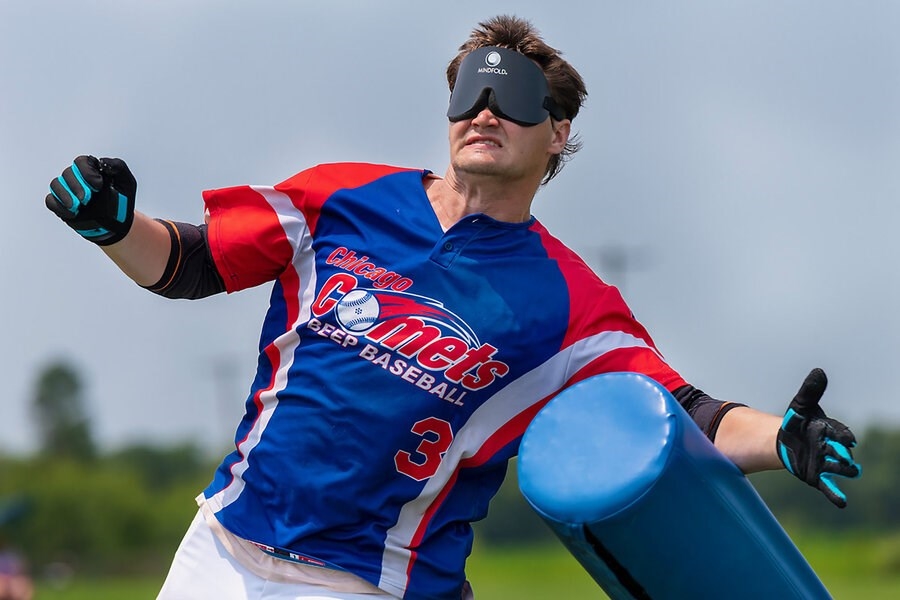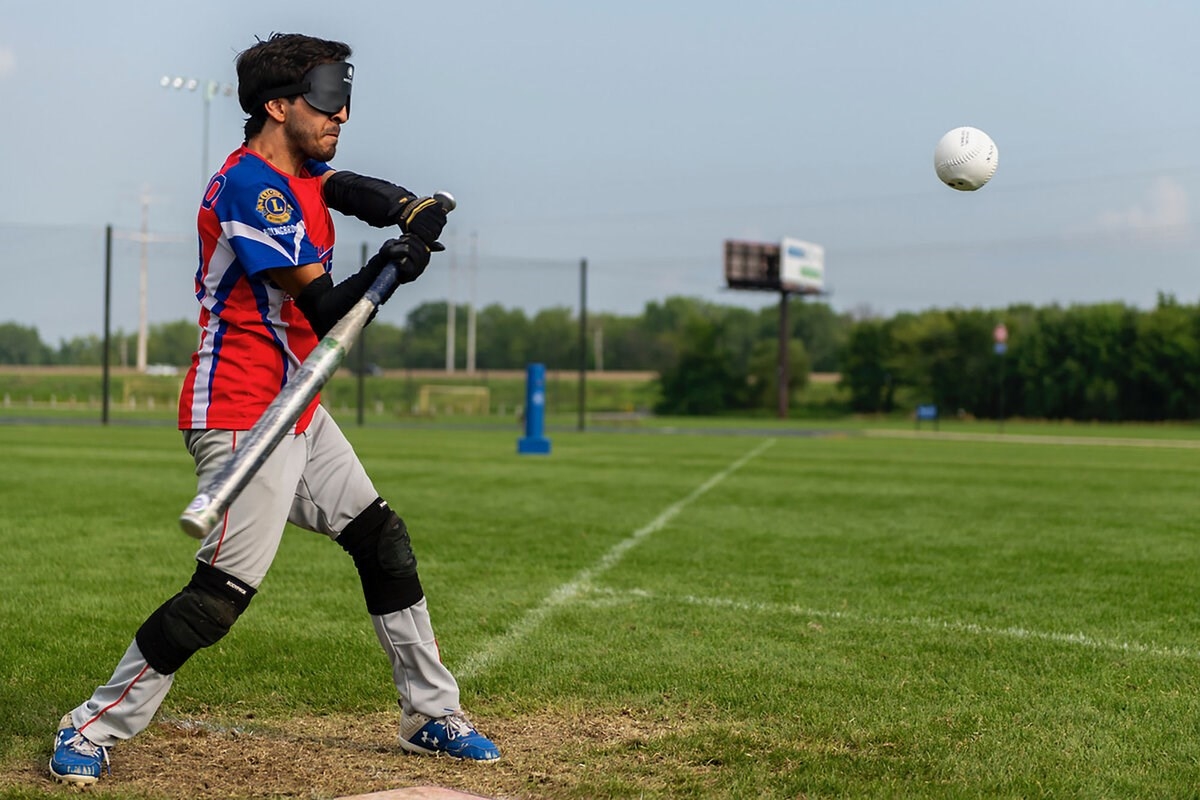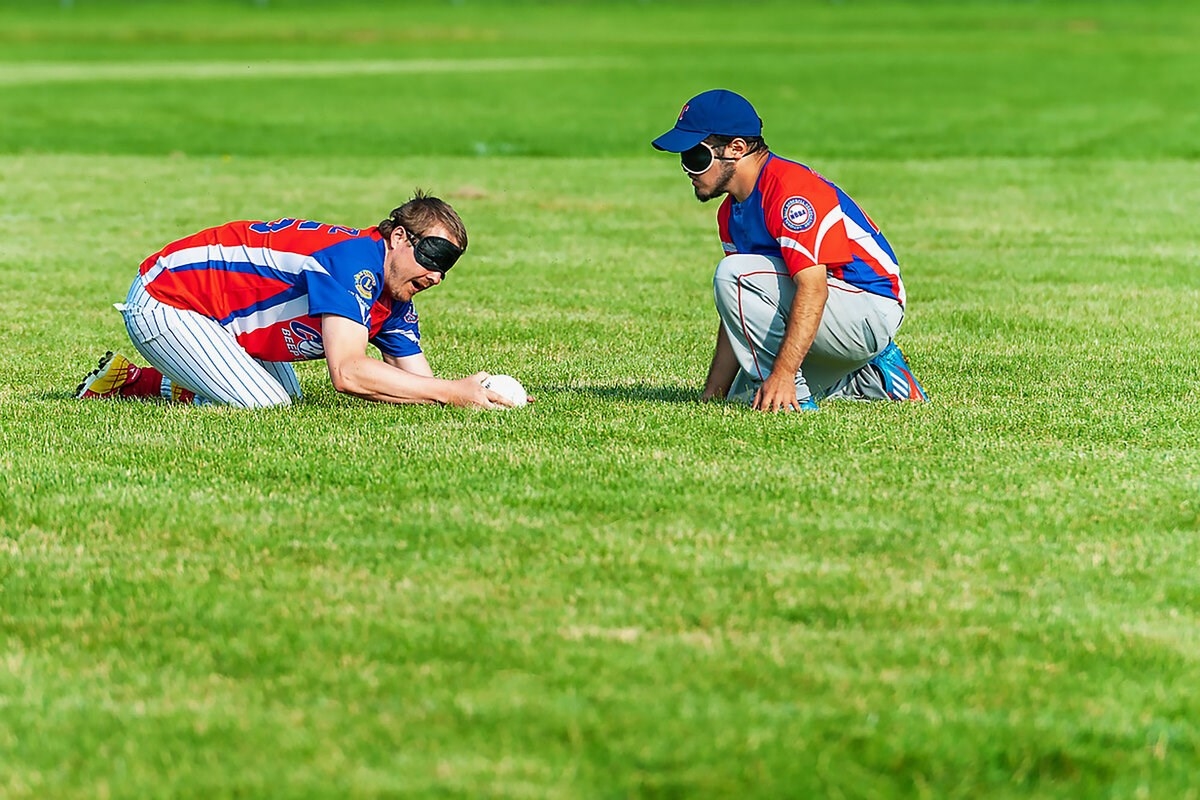REPRINTED WITH PERMISSION FROM THE CHRISTIAN SCIENCE MONITOR
The World Series of adaptive-sport beep baseball is about to kick off – offering blind players the opportunity to hit, field, and build community while participating in the national pastime.
 Dustin Youngren of the Chicago Comets hits the base at the 2019 Indy Beep Ball Bonanza in Indianapolis, June 2019. Players, who have varying degrees of vision, wear blindfolds during games.Courtesy of John Lykowski
Dustin Youngren of the Chicago Comets hits the base at the 2019 Indy Beep Ball Bonanza in Indianapolis, June 2019. Players, who have varying degrees of vision, wear blindfolds during games.Courtesy of John Lykowski
| Bolingbrook, Ill.
Clad in a stylish red uniform with blue trim, Rich Schultz fiercely swings at the pitch and dashes toward the base. Mr. Schultz, a teacher, is one of more than 100 weekend warriors playing baseball on a recent Saturday morning at a sprawling park in a Chicago suburb. Eight teams from six states competed in the two-day tournament, in its 24th year.
The Chicago Comets, Mr. Schultz’s team, won two and lost two. The camaraderie was more important than winning. “There’s a real sense of community – not only the guys on your team but the other teams,” says Mr. Schultz. “They understand you.”
Nothing too out of the ordinary. Except that the players are blind. The teams belong to the nationwide 24-team National Beep Baseball Association (NBBA), formed in 1976.
Beep baseball is a modified version of the national pastime. The 16-inch ball has a noisemaker that beeps. A teammate, a sighted volunteer, serves as the pitcher. There are just two bases, 4-foot-tall padded cylinders. One of them will buzz when the batter strikes the ball. The batter is out if a fielder cleanly grabs the ball before the batter touches the base. Otherwise, a run is tallied.
The games have the same varied pace of traditional baseball: stretches of inactivity, such as foul balls and swinging strikes, followed by frenetic action, with fielders scrambling and batters sprinting toward the bag. Most of the players grew up as avid baseball fans or played other sports as youths.
“He’s very competitive,” says Christina Smerz of Mr. Schultz, her husband, who wrestled in high school, despite his lifelong blindness. “He gets a real sense of freedom playing sports.”
The Comets will be one of the 19 teams competing in the 2025 Beep Baseball World Series, starting Sunday near St. Louis. They last won it in 2003.
Beep baseball has been on a steady upswing, according to Stephen Guerra, NBBA secretary, and this year’s World Series is drawing unprecedented publicity and support. The NBBA has 500 members, split about equally between players and volunteers. That’s double the number from two decades ago, according to Mr. Guerra, who is a player for the Minnesota Millers.
 Courtesy of John LykowskiAlex Gamino of the Chicago Comets takes a turn at bat at the 2024 Beep Baseball World Series in St. Charles, Missouri.
Courtesy of John LykowskiAlex Gamino of the Chicago Comets takes a turn at bat at the 2024 Beep Baseball World Series in St. Charles, Missouri.
Bob Costas, the Emmy-winning sports broadcaster, has promoted the World Series on both a baseball podcast and a video made for MindsEye, a nonprofit sponsoring the tournament.
Beep baseball dates from 1964 when Charles Fairbanks, an engineer at a telephone company, designed the first practical beeping baseball. Mirroring the general societal attitude toward those with disabilities, the sport evolved from a genteel, slow-moving one, in which players were basically coddled, into a highly competitive activity. Fielders dive after balls, and batters fling themselves into the padded bases.
The desire to win is strong, as is the eagerness to do well. Comet Dustin Youngren remembers his debut several years ago with vivid clarity. “It was the third inning. [Coach] JT [Herzog] said, ‘Dustin, you’re in.’ I was so nervous. But I hit it, got to the base, and scored a run – in my first at bat,” says Mr. Youngren, who is pursuing a bachelor’s degree in creative writing.
Beep baseball is a central part of his life. “I love my team. I get a lot of support,” he says. “I want to play forever.”
The sport’s players share a bond, no matter their uniform. Mr. Herzog, now a former coach, has one sighted son, Adam, who played travel baseball. His son John, who is blind, competed for the Comets. “With travel ball you’d see three guys in the same uniform walking down the hall in the hotel. With beep ball you’d see three guys together, and they all had different uniforms,” he recalls.
Begun in 1995, the Comets practice every Saturday during the season and play a 20-game schedule. The 12-member roster has fluctuated, but it often has included players as young as teenagers and women as well. Many on the team are either in school or gainfully employed. The current roster includes a rehabilitation therapist and an IT support system engineer.
 Courtesy of John LykowskiTeammates Richard Schultz (left) and Daniel Hernandez field a ball at the Indy Beep Ball Bonanza in Indianapolis, June 2019.
Courtesy of John LykowskiTeammates Richard Schultz (left) and Daniel Hernandez field a ball at the Indy Beep Ball Bonanza in Indianapolis, June 2019.
On hand at the recent Saturday game is David Smolka, a 60-something former league MVP. Cooper, his Labrador leader dog, lies at his feet. “I was pretty good,” he says with a chuckle. “I’d get upset with myself if I didn’t do well. I learned to talk to myself and realize it’s OK to have a bad day, just like you might have a bad day at work.”
Mr. Smolka coached the Comets when he retired from playing. His players learned much more than how to hit or field. “Some had to learn how to get to practice. They had to learn bus routes, how to get equipment,” he says. “My mom never pampered me. I didn’t pamper them.”
That sentiment underplays the supportive aspect of beep baseball. Like other longtime players, Mr. Schultz regards himself as a mentor. “With me, it’s like [they realize], ‘Whoa, I can get married. I can have kids,’” he explains. “I’ll help them network for jobs. They learn about resources and the latest technologies.”
Beep players understand, all too well, that off the diamond it’s not an even playing field. “People look down on you. They think you should be flipping burgers,” says Mr. Youngren. “I want to break that line of thinking, to show people what I can do.”
Mr. Schultz teaches young people who are blind as part of his job as a special education teacher. He uses beep baseball to illustrate the possibilities for them. Often it’s their parents who need to be reached. “They can have such negative expectations,” he says.
Speaking of underestimating the abilities of those who are blind: Behind home plate, his phone on a tripod facing the field, is announcer David Benney. An ex-Comet for two decades, he’s streaming the game on Facebook. A batted ball from a Comet is quickly and flawlessly scooped up by Stan Griffin, No. 66 emblazoned on his Cleveland Scrappers uniform.
“Not a great hit. Can’t get it by No. 66,” Mr. Benney tells his audience.
His skill at “seeing” the game, despite his blindness, is even more pronounced with the next batter. “That must be a close play. I’m sure there will be some arguing,” he announces correctly.
His uncanny play-by-play is fueled by skill. “I do it by sound, experience, training,” explains Mr. Benney, a lawyer.
Mr. Griffin, by the way, has his No. 1 fan at the game. Like other spectators, Chantal, his wife, knows not to cheer until the play is complete, so the buzzing base and batted ball can be heard by batters and fielders, respectively. “I don’t even like baseball,” she sheepishly admits. “She likes No. 66,” a Scrapper chirps. She also likes the Scrappers. “This has turned into a family,” she explains.
The family angle is a strong part of beep baseball. It takes a full lineup of volunteers to field a team. Games require a sighted pitcher and catcher, two spotters in the field to call out hit balls, umpires, a scorekeeper, a dugout assistant or two, and likely a van driver.
Ms. Smerz, a spotter, met Mr. Schultz in an education class at Illinois State University. She, too, became a special education teacher. People who are blind “are such a small community,” she says. “They really understand each other. The relationships are special.”
Their son, Curin, who plays travel baseball, watches next to Mr. Benney, the announcer. His eyes fixed to the action, he doesn’t miss a pitch – or some larger meaning about beep baseball. “He understands his father’s vision impairment doesn’t limit him,” says his mother. “I think he’s learning empathy, too. Kindness is important.”
Page created on 7/22/2025 6:30:12 PM
Last edited 7/22/2025 6:46:05 PM
